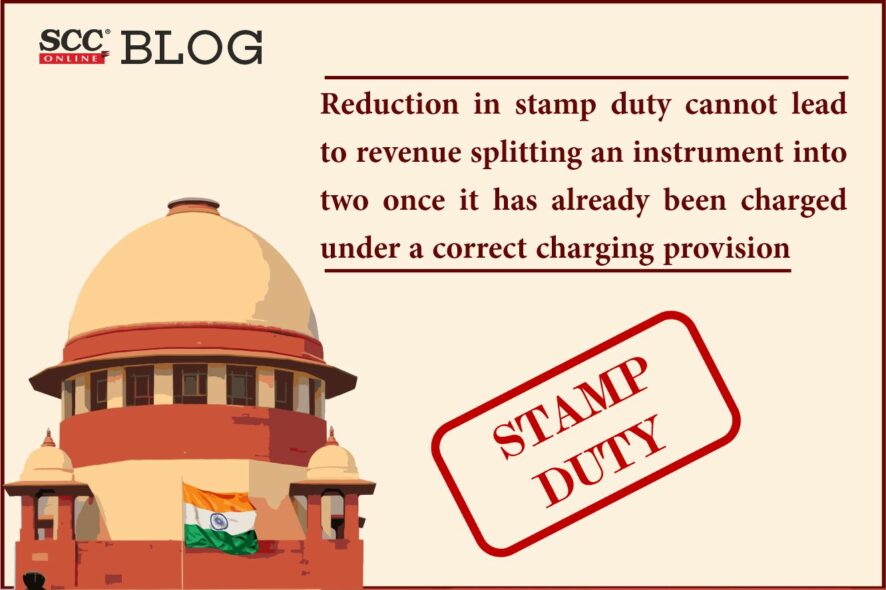Supreme Court: While dealing with a case under the Gujarat Stamp Act, 1958, the bench of Hemant Gupta and V. Ramasubramanian*, JJ has held that once a single instrument has been charged under a correct charging provision of the Statute, namely Article 20(a), the Revenue cannot split the instrument into two, because of the reduction in the stamp duty facilitated by a notification of the Government issued under Section 9(a).
In the case at hand, the Oriental Bank of Commerce (OBC) granted certain facilities to a borrower and the borrower committed default in repayment. Unable to recover the loan, the Bank assigned the debt in favour of the appellant, an Asset Reconstruction Company registered with the Reserve Bank of India under Section 3 of the Securitisation and Reconstruction of Financial Assets and Enforcement of Security Interest Act, 2002 (SARFAESI Act).
An audit objection was raised by the Office of the Accountant General on the ground that the deed of assignment contained a reference to a Power of Attorney (PoA) in Schedule 3 and that the said PoA was chargeable to stamp duty under Article 45(f) of Schedule-I to the Act. A demand for deficit stamp duty to the tune of Rs.23,53,800/¬ was raised pursuant to the audit objection.
The Gujarat High Court examined the recitals contained in the deed of assignment and found that the Bank had agreed to execute an irrevocable PoA in favour of the appellant, substantially in the form set out in Schedule 3 of the deed of assignment. The form set out in Schedule 3 contained recitals empowering the assignee, as the agent of the Bank, to sell any immovable property. Therefore, considering the fact that Article 45(f) of Schedule I to the Act makes a PoA given for a consideration and containing an authority to sell any immovable property chargeable to stamp duty as a conveyance, the High Court came to the conclusion that the appellant has to pay stamp duty as fixed by Article 45(f). The High Court opined that merely because the power to sell, forms part of the deed of assignment under Schedule 3, the appellant could not escape the charge of duty and that the PoA is required to be considered independently.
The Supreme Court was, however, of the opinion that the High Court overlooked the fact that there was no independent instrument of PoA and that in any case, the power of sale of a secured asset flowed out of the provisions of the SARFAESI Act and not out of an independent instrument of PoA.
Section 2(zd) of the SARFAESI Act defines a ‘secured creditor’ to mean and include an Asset Reconstruction Company. The appellant had acquired the financial assets of OBC in terms of Section 5(1)(b) of the SARFAESI Act. Therefore, under sub-section (2) of Section 5 of the SARFAESI Act, the appellant shall be deemed to be the lender and all the rights of the Bank vested in them. In fact, under Amendment Act 44 of 2016, sub-section (1A) was inserted in Section 5 of the SARFAESI Act, exempting from stamp duty, any document executed by any bank 5 under Section 5(1) in favour of an Asset Reconstruction Company acquiring financial assets for the purposes of asset reconstruction or securitization.
It was further explained that for invoking Article 45(f), two conditions have to be satisfied. They are,
- the PoA should have been given for a consideration; and
- an authorization to sell any immovable property should flow out of the instrument.
In the case on hand, the consideration paid by the appellant to OBC, was for the purpose of acquisition of the financial assets, in respect of a particular borrower. The draft of the PoA contained in Schedule 3 of the deed of assignment was only incidental to the deed of assignment. The deed of assignment has already been charged to duty under Article 20(a) which deals with “conveyance”. In fact Article 45(f) also requires a PoA covered by the said provision to be chargeable to stamp duty under Article 20.
The Court, hence, held that after having accepted the deed of assignment as an instrument chargeable to duty as a conveyance under Article 20(a) and after having collected the duty payable on the same, it is not open to the respondent to subject the same instrument to duty once again under Article 45(f), merely because the appellant had the benefit of the notifications under Section 9(a).
Hence, the judgment of the High Court and the demand made by the Chief Controlling Revenue Authority was set aside.
[Asset Reconstruction Co. (India) Ltd v. Chief Controlling Revenue Authority, 2022 SCC OnLine SC 515, decided on 26.04.2022]
*Judgment by: Justice V. Ramasubramanian
Counsels
For appellant: Senior Advocate V. Chitambaresh
For State of Gujarat: Advocate Archana Pathak Dave






